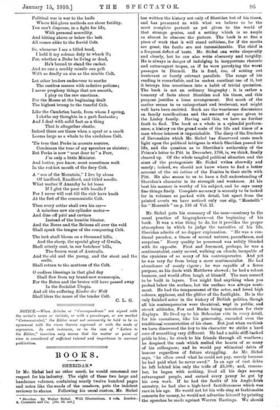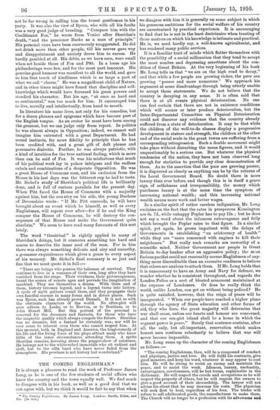BOOKS.
SHERIDAN.* IF Mr. Sichel had no other merit, he would command our respect for his industry. The sight of these two large and handsome volumes, containing nearly twelve hundred pages and notes like the sands of the seashore, puts the indolent reviewer to shame. Following bis usual custom, Mr. Sichel • Sheridan. By Waiter /Nebel. With Illustrations. vols. London : A. Constable and Co. [Sls. 6d. net.]
has written the history not only of Sheridan but of his timed, and has presented us with what we believe to be the most complete portrait as yet given to the world of that strange genius, and a setting which is so ample as almost to obscure the picture. The book is so fine a piece of work that it will stand criticism, for if the merits are great, the faults are not inconsiderable. The chief is a frequent defect of taste. Mr. Bickel can write eloquently and clearly, but be can also write obscurely and turgidly. He is always in danger of indulging in inopportune rhetoric and extravagant tropes, as if he were parodying the worst passages in Disraeli. He is fond, too, of setting out irrelevant or barely relevant parallels. The range of his reading is remarkable, and he makes excellent use of it, but it betrays him sometimes into a habit of trivial quotation. The book is not an ordinary biography : it is rather a treasury of facts about Sheridan and his times, and this purpose justifies a loose arrangement. But much of the matter seems to us unimportant and irrelevant, and might well have been omitted. Such are the wearisome discussions on family ramifications and the amount of space given to the Linley family. Having said this, we have no further fault to find. The book as a whole is a splendid perform- ance, a history on the grand scale of the life and times of a man whose interest is imperishable. The diary of the Duchess of Devonshire which Mr. Sichel has discovered casts much light upon the political intrigues in which Sheridan passed his life, and the question as to Sheridan's authorship of the Prince's letter to Pitt in December, 1788, is, we think, finally cleared up. Of the whole tangled political situation and the aims of the protagonists Mr. Sichel writes shrewdly and sanely ; indeed, we should not know where to find a better account of the vie intim° of the Foxites in their strife with Pitt. He also seems to us to have a full understanding of Sheridan's character in its strength and weakness. At his best his manner is worthy of his subject, and he says many fine things finely. Complete accuracy is scarcely to be looked for in volumes so packed with detail, but apart from the printed errata we have noticed only one slip, "Monteith" for " Monreith " on p. 116 of Vol. II.
Mr. Sichel puts his summary of the man—contrary to the usual practice of biographers—at the beginning of his book. It was a wise thing to do, for it provides the proper atmosphere in which to judge the narrative of his life, Sheridan admits of no dapper explanation. " He was a con- tinual paradox, a tissue of second natures, parentheses, and surprises." Every quality he possessed was subtly blended with its opposite. First and foremost, perhaps, he was a sentimentalist, easily moved, walking on clouds, incapable of the cynicism of so many of his contemporaries. And yet he was very far from being a mere sentimentalist. He had abundance of manly vigour ; he was capable of a fierce purpose, as his duels with Matthews showed; he had a robust humour, and would often laugh at himself. The man seemed to be built in layers. You might find anything when you probed below the surface, but the surface was always Senti- ment. He had the temperament of the actor, and loved high colours, applause, and the glitter of the footlights. He is the only finished actor in the history of British politics, though all his contemporaries were theatrical, wept in public, and struck attitudes, Fox and Burke being notorious for their displays. He lived up to his Bohemian role in every detail, for his casneleess, like his generosity, exceeded even the traditional eccentricities of his class. But just when we think we have discovered the key to his character we strike a hard core of something very different. He had a noble stiff-backed pride in him ; he stuck to his friends through all weathers ; he despised the cash which melted the hearts of so many of his colleagues; and he would pay whimsical debts of honour regardless of future struggling. As Mr. Sichel says, " he often owed what he could not pay, merely because he had paid what he never owed." In an age of vast debts he left behind him only the trifle of £5,500; and, remem- ber, he began with nothing, lived all his days among extravagant people, and earned every penny he got by his own work. If he had the faults of his Anglo-Irish ancestry, he had also a high-bred fastidiousness which was rare in his age. He would not let his wife sing at fashionable concerts for money, he would not advertise himself by printing the speeches he made against Warren Hastings. We should
not be far wrong in calling him the truest gentleman in his party. It was also the view of Byron, who with all his faults was a very good judge of breeding. " Compare him with the Coalitionist Fox," he wrote from Venice after Sheridan's death, " and the pensioner Burke as a man of principle."
His personal vices have been enormously exaggerated. He did not drink more than other people, till his nerves gave way and disappointment and anxiety drove him to excess. He hardly gambled at all. His debts, as we have seen, were small when set beside those of Fox and Pitt. In a loose age his philanderings were few, and for the most part innocent. His genuine good humour was manifest to all the world, and gave to him that touch of kindliness which is so large a part of what we call " charm." He was a magnificent child of Nature, and in other times might have found that discipline and self- knowledge which would have focussed his great powers and steadied his character. But his age, " at once so hard and so sentimental," was too much for him. It encouraged him to live, morally and intellectually, from hand to month.
In literature his name lives, not only for his comedies, but for a dozen phrases and epigrams which have become part of the English tongue. As an orator he must have been among the greatest, but we can judge only from report. In politics he was almost always in Opposition; indeed, we cannot well imagine him entrusted with a great Department. He had sound instincts, far more fidelity to principle than he has been credited with, and a great gift of deft phrase and persuasive dialectic. Further, he was always patriotic, with a kind of intuition for the true national feeling, which is more than can be said of Fox. It was his misfortune that much of his political work lay in palace intrigues and the endless cabals and combinations of a desperate Opposition. He was a great House of Commons man, and his exclusion from the House in his last days was the bitterest cup he had to taste. Mr. Sichel's study of Sheridan's political life is brilliantly done, and is full of curious parallels for the present day. When Pitt faced the House of Commons with a majority against him, but the con ntry on his side, the young Duchess of Devonshire wrote : " If Mr. Pitt succeeds, he will have brought about an event which he himself, as well as every Englishman, will repent ever after—for if he and the King conquer the House of Commons, he will destroy the con- sequence of that House and make the Government quite absolute." We seem to have read many forecasts of this sort lately.
The word " theatrical " is rightly applied to many of Sheridan's doings, but it connotes something too bard and coarse to describe the inner soul of the man. For in him there was always something delicate and airy and nnearthy,
a gossamer exquisiteness which gives a grace to every aspect of his memory. Mr. Sichel's final summary is so just and
fine that we must quote it in full:—
" There are beings who possess the talisman of survival. They continue to live in a romance of their own, long after they have vanished from the stage. Their vividness, their picturesqueness, haunt the scenes of remote ages and pervade the imagination of mankind. They are themselves a drama. With them and of them, history becomes legend, and a legend turns into history. A cycle of myth gathers round them, and they propagate their own fanciful essence in many forms and in divers places. Such was Byron, such has already proved Disraeli. It is not so with the obstinate characters of the world. No after-plot will ever adhere to Locke, or to Newton, or to Bentham, or to John Stuart Mill. But this portent of the personal is reserved for the dreamers and fantasts, for those who have the magnetic quality which always compels the future. Sheridan was no dreamer, but a fantast he certainly was; nor will he ever cease to interest even those who cannot respect him. At this moment, both in England and America, the tragi-comedy of his life and the living force of his plays attract many who know little of the inner circumstances attending them. A sprite Sheridan remains, hovering above the puppet-show of existence. He belongs not to the white-robed immortals who sit radiant and aloft, but to the elfin band who have never faded from the atmosphere. His province is not history but wonderland."







































 Previous page
Previous page